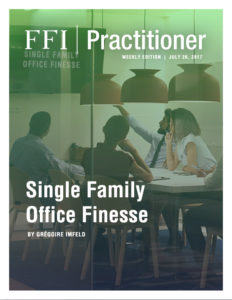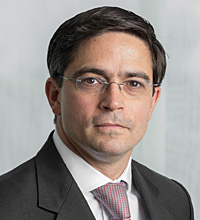
View this edition in our new enhanced digital edition format with supporting visual insight and information.
Past and present
Family offices have been following wealth. Historically, in Europe, private banking addressed most family issues. In the US, that concept followed the Titanic and did not cross the Atlantic that well. Whilst wealth was being created, the US private banking industry was not completely tuned in and may have lacked some hindsight. It seems to have focused on the more affluent and more profitable, rather than the most prominent families. The unattended services pushed wealthy families to create their own structures. As wealth grew in the US, the family centric solution became a reference.
Today, the family office has found a significant place in the wealth industry. The 2008 crisis was an important milestone in the history of family offices. The popular perception that all banks, all banking services, were responsible for the losses of many promoted the importance for independence. As a result, the family office became a pertinent solution for wealthy families. A Google internet search using the term “family office” in 2009 produced 169mio hits. In February 2010, 282mio hits. In May 2014 1.59billion hits, showing significant shift in popularity.
Today, family offices have attracted much attention but various forms of confusion have resulted. The environment of family offices has grown — single family offices, multi-family offices, and private offices provide a vast array of characteristics. There are as many definitions of family offices as family offices themselves. This article focuses, therefore, only on the theme of single family offices.
The single family office
A single family office is a family-centric organization. As no family is the same, no single family office should be. So how should families go about creating their own family office?
A common starting point for families is to define the family office governance by determining the framework for committees, activities, clarifying roles and responsibilities, and accountability as well as the decisional processes. (As a reminder, democracy is a subjective notion and understood differently from one culture to another.) Activities are centered frequently around recurring themes, one of which is the investments. Recently, an observed new trend for families is to separate the family office from the investments and create investment offices, which, depending on the nature of the investments, is a judicious choice.
Defining what to insource and outsource is also a central issue. Prior to 2008, a family office’s size was perceived as a status, so insourcing felt right. Today the trend is to be lean and concentrate on strategic assets. The level of confidentiality is also a factor that helps provide a better understanding in that debate. Sometimes the family prefers to keep the information close, whilst for some families a contractual agreement with staff or external parties suffices.
Acknowledging existing skills is also important, including the degree of involvement of family members in the family office. If a family member is recognized in the industry as having the needed skills, is willing and has the time, a family may want to consider involving him or her. This inclusion may make sense on paper, but depending on the responsibility, it may generate undesired complications. One can fire a non-family member, but firing a family member has different consequences.
An increasing concern is finding a CEO, but the true challenge is hiring the “right” CEO. The industry is young, the number of experienced family office CEOs is scarce. But, a family also needs trust. So quite rapidly, the debate revolves around positioning “competency versus trust.” Trust is particularly important in emerging markets, where the insecurity of the environment as well as wealth itself can be a threat to the family. On the other hand, other regions will take trust for granted and focus principally on competency.
Nowadays though, due to the frenzy of the family office industry, the precious personalization of family offices seems to be fading. Probably due to a compulsive necessity to industrialize — the obsessive need to create processes and streamline solutions. So how can family offices regain the finesse which is the key to their historical success?
Finesse
Finesse is a combination of some technical issues mentioned herewith but also must incorporate more general dynamics. Family offices are part of an ecosystem. They are a tool in a global family governance framework. They evolve with the system, the family, and with generations in cycles. Whilst concerns usually gravitate around how to create or further institutionalize a family office, the success of any family office starts with the family’s objectives.
A family constitution captures the objectives and the essence of the family. It formulates and formalizes those family objectives into a strategy. One key success factor is to adapt the constitution to the current family dynamics, adjusting both scope and exhaustiveness. A living constitution needs to breathe and evolve — skillful practitioners manage to build that in from the beginning. Some constitutions also include a family office mission statement. Such a definition is a good starting point as it will help align family members to the purpose of that new family office tool as well as provide the base for its creation.
The proliferation of family offices is creating many new independent structures around the world. As a result, one of the key future challenges is that with independence may come isolation. Whilst access to information is no longer an issue, its abundance is. Therefore, communication platforms, events or organization with networking, sharing information and qualitative data will thrive in the future — providing a vital role in insuring that missing link, insuring that family offices continue to play a significant and growing role in the future of families’ wealth.
About the contributor
 Grégoire Imfeld, ACFWA, joined the Pictet Family Office team in 2008 as a relationship manager and is now responsible for Pictet’s Family Office Services globally. His main area of expertise is family governance; concentrating on strategy, organisation and investments. He also advises families and family offices on their wealth strategies, their financial governance and operational governance. He graduated from the University of London in Mathematics and Psychology. Grégoire can be reached at gimfeld@pictet.com.
Grégoire Imfeld, ACFWA, joined the Pictet Family Office team in 2008 as a relationship manager and is now responsible for Pictet’s Family Office Services globally. His main area of expertise is family governance; concentrating on strategy, organisation and investments. He also advises families and family offices on their wealth strategies, their financial governance and operational governance. He graduated from the University of London in Mathematics and Psychology. Grégoire can be reached at gimfeld@pictet.com.
About Pictet
Pictet is a 9th generation family-run business, focusing on investment-led services only. In 212 years, Pictet has had 41 partners, each with an average tenure of over 20 years. Pictet has assets under management or custody totaling USD 477 bn, spread over more than 80 countries, over 4100 employees in 26 locations worldwide and is considered one of the leaders in its industry.






